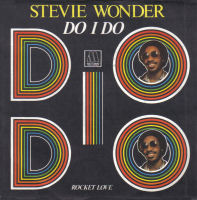| "Do I Do" | ||||
|---|---|---|---|---|
 | ||||
| Single by Stevie Wonder | ||||
| from the album Stevie Wonder's Original Musiquarium I | ||||
| B-side | "Rocket Love" | |||
| Released | February 19, 1982 | |||
| Recorded | 1981 | |||
| Genre | ||||
| Length | 5:02 (single version) 10:30 (album version) | |||
| Label | Tamla | |||
| Songwriter | Stevie Wonder | |||
| Producer | Stevie Wonder | |||
| Stevie Wonder singles chronology | ||||
| ||||
| Alternative covers | ||||
 Alternate 7-Inch single cover | ||||
"Do I Do" is a song written and performed by American singer and songwriter Stevie Wonder, first released on the compilation album Stevie Wonder's Original Musiquarium I in 1982. The single peaked at #2 on the US Billboard soul chart and #13 on the Billboard Hot 100. [3] On the Billboard dance chart, "Do I Do" reached number one for two weeks. [4] Overseas, it reached #10 in the UK. [5]